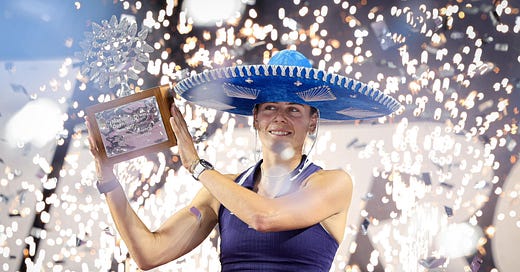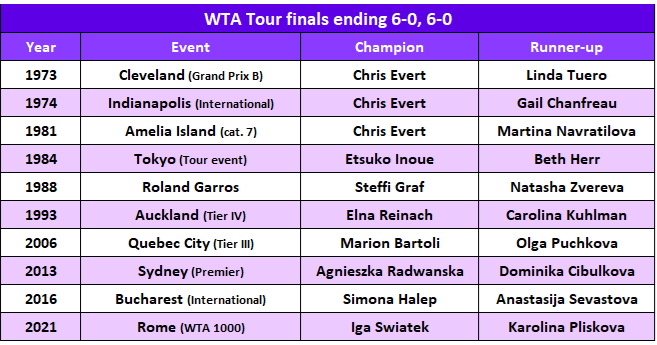WTA500 Mérida: Emma Navarro vs Emiliana Arango final analysis
Focused, ruthless and relentless, Navarro recorded the 11th double bagel Tour final win since 1973
Emma Navarro (WTA #9) crushed qualifier Emiliana Arango (WTA #133) 6-0, 6-0 in the WTA 500 Mérida final to conquer her second career Tour title and first at WTA 500 level.
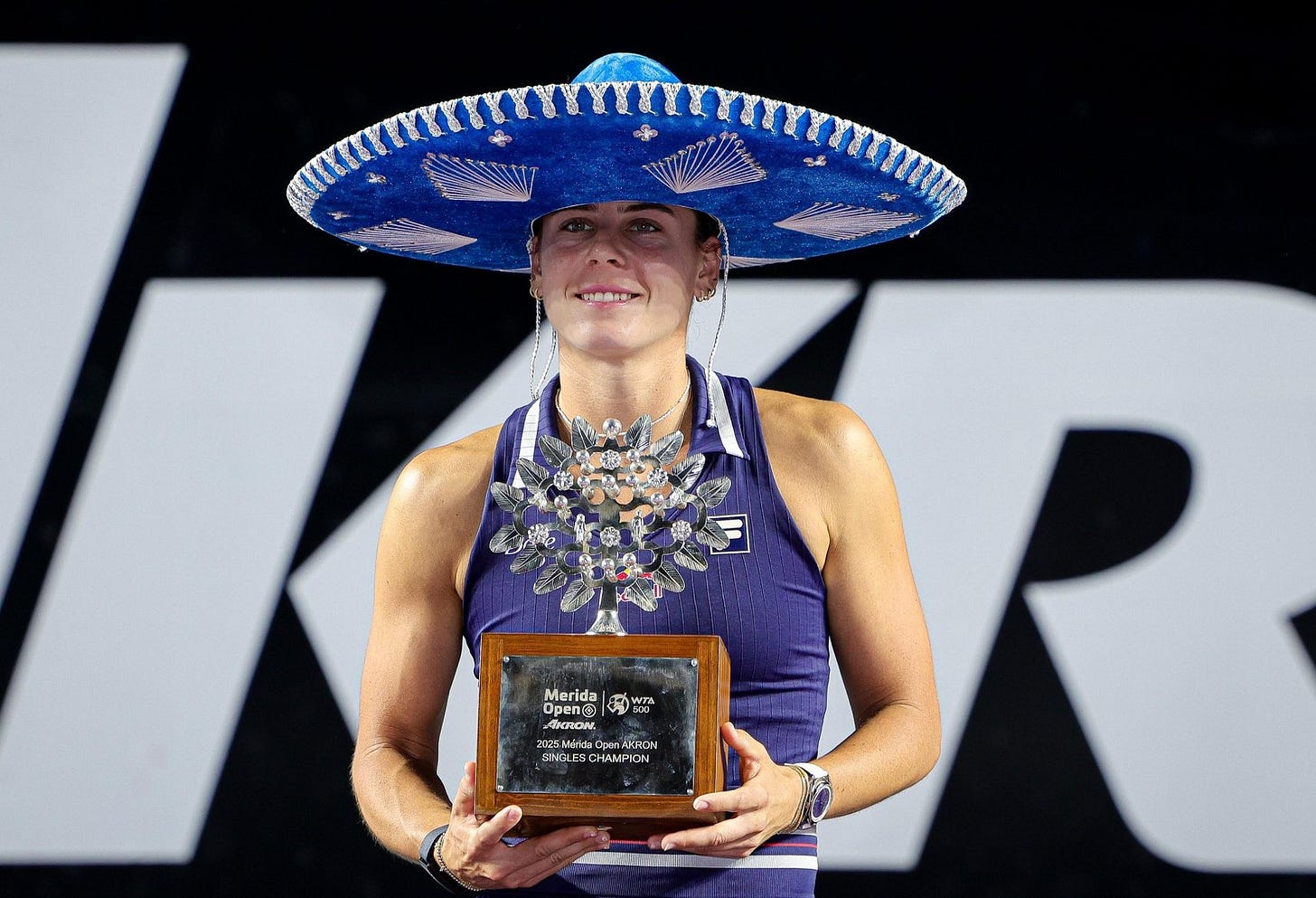
A week to remember for Navarro started when she was assigned the top spot in a Tour main draw for the first time in her career. It ended with the 23-year old American breezing through the opposition for the loss of just 15 games across 4 matches and celebrating it with an on-court victory dance with her father to the sound of Mariachi.
📺 source: WTA Tv
Arango also enjoyed a(nother) career week in Mexico. Fresh off her biggest title to date at WTA 125 Cancún, the 24-year old Colombian strung 6 more wins in Mérida to extend her longest ever unbeaten run to 11 matches. One of those triumphs got Arango past the quarter-final stage at a WTA Tour event for the first time in three attempts and guaranteed sufficient ranking points for a debut entry into the Top-100 (she is up to #80 in the latest rankings).
After so many positive hallmarks — first Tour final, longest win-streak, new career-high ranking — Arango registered a different type of milestone on Sunday when she suffered her first ever double bagel loss as a pro, after 381 matches.
Since its inaugural 1973 season, this was the 11th time a WTA Tour final ended with the runner-up unable to win a single game. Chris Evert was responsible for the first three occurrences and the list also features the shortest ever Grand Slam final: Graf needed just 32 minutes to double bagel Zvereva in the 1988 French Open final.
In Mérida, Navarro was the overwhelming pre-match favourite for the title because she had a huge advantage in big-match experience, was a lot fresher — to reach the final, Arango needed twice more matches (6 vs 3) and thrice more on-court time (12h54 vs 3h46) — and the match-up clearly suited her.
Arango is a grinder that wins matches by forcing opponents into grueling baseline exchanges. But that is the sort of tennis that Navarro actually thrives on. The American possesses the athletic ability to endure long rallies and the mental strength and discipline to remain patient and avoid self-destruction.
If Navarro rarely beats herself with errors, she played with the added safeguard of knowing she could take control of rallies at any moment due to her superior firepower and Arango’s lack of a big weapon.
The top seed demonstrated all these traits in the very first game of the final.
→ Navarro started off with a forceful backhand that showcased her “serve+1” punch…
→ …then she fired a forehand winner from the middle of the baseline to suddenly end a medium-length rally…
→ …and outrallied Arango in the first long point of the match (19 shots)
It didn’t get any better for Arango on her serve as she was broken to love following 2 double faults and 2 winners from Navarro.
→ Navarro won Arango’s opening serve point by finessing a forehand drop shot winner on the 14th shot
Arango was up against it tennis-wise. It became evident the first-time Tour finalist stood no chance of winning once it was visible that some sort of respiratory issue was also bothering her.
It was very symbolic to Arango’s prospects that the only game point she accrued in the entire match developed into the sort of long rally she loves to play but ended with an error coming off her racquet.
By the end of the final, Arango had won just 2 out of 13 points that lasted 9+ shots.
It wasn’t much better in other rally lengths as Navarro won nearly twice more short points (20 to 11) and built a 14-point gap in medium rallies (22 to 8).
In full control of the match, Navarro dictated play from the back of the court, chose all the right moments to come forward for the kill and executed with impeccable efficiency once she reached the forecourt.
The American finished with a 29-9 score in baseline duels and a 71% (32/45) baseline win-rate, against 20% (10/51) from Arango.
At the net, Navarro went a formidable 13-for-14 (93%).
Dominating all areas of the match, Navarro concluded the final with 13 more winners (19 to 6), 8 fewer unforced errors (9 to 17) and 11 fewer forced errors (6 to 17).
Among the many impressive stats piled up by Navarro during the Mérida final, we would like to finish this analysis by pointing out her fantastic performance in down the line groundstroke strikes.
The top seed managed to hit 15 winning line groundstrokes (10 forehands and 5 backhands) without making a single unforced error, as highlighted by the blue box below. Perfection!
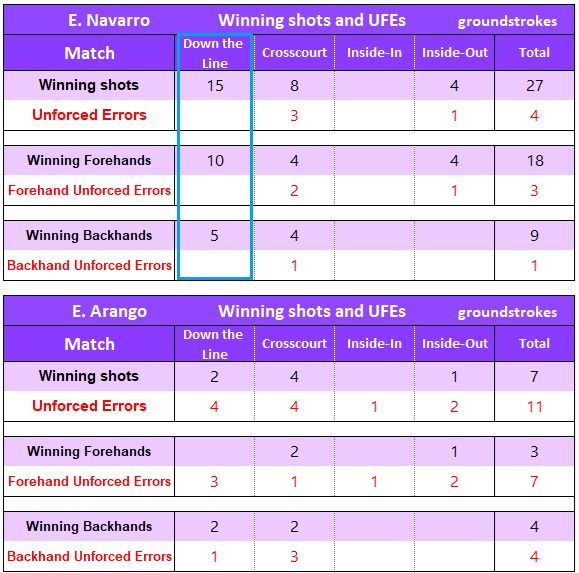
Emma Navarro (WTA #9, seed 1) vs Emiliana Arango (WTA #133, qualifier)
2025 Mérida final - Match Data
Set by Set Stats
Strokes Breakdown

Winners and Errors (returns and rally shots)
Serve and Return
1st Serves
2nd Serves
Return & rallying performance
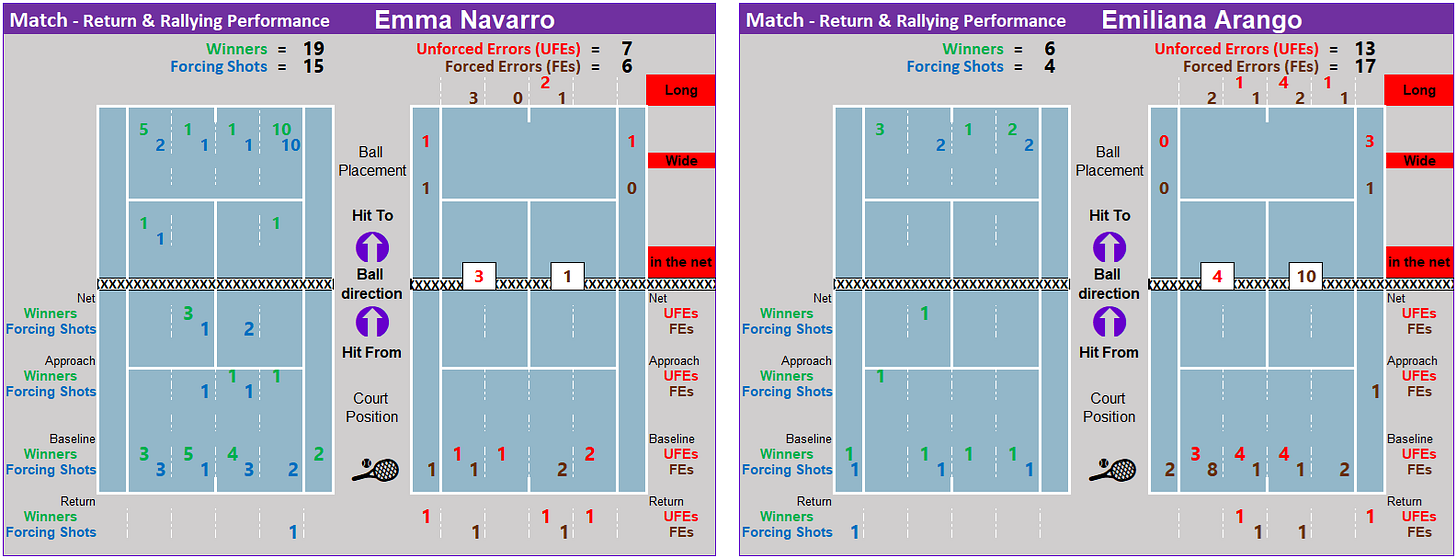


Rally length
Points won breakdown
This final section gives a last, broader look at the match by presenting how each player won points. Points are listed according to their frequency (highest to lowest) and are named in relation to the last touch on the ball. For simplicity, groundstrokes hit from the 5th shot onwards are grouped together.
Breakdown by side (FHs or BHs)

Breakdown by error type (UFEs or FEs)

To find out more about the stats published here, please visit the following post.
While we follow the same criteria used on all major tennis events, our stats are collected through our own video analysis and are not official WTA or ITF stats.
Thanks for reading!
— Tennis Inside Numbers

